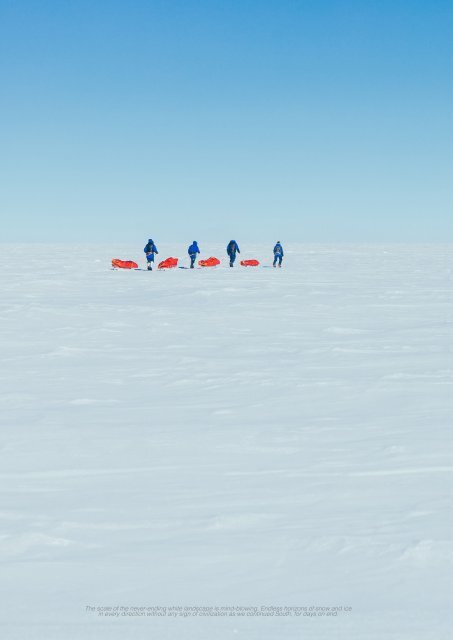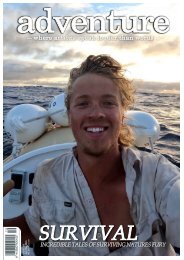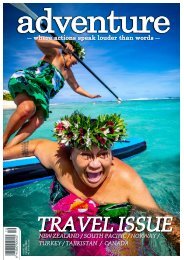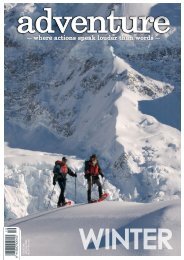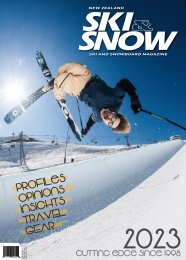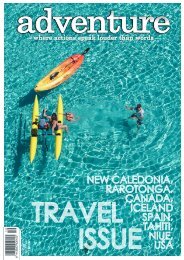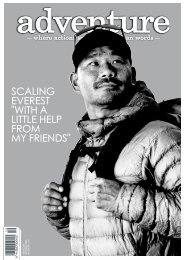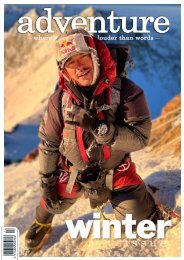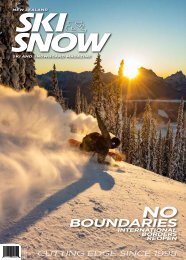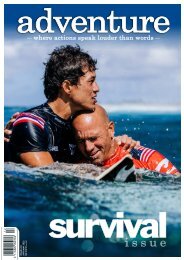Adventure Magazine
Issue 237: Survival Issue
Issue 237: Survival Issue
You also want an ePaper? Increase the reach of your titles
YUMPU automatically turns print PDFs into web optimized ePapers that Google loves.
The scale of the never-ending white landscape is mind-blowing. Endless horizons of snow and ice<br />
in every direction without any sign of civilization as we continued South, for days on end.<br />
"Best moment?<br />
The moment<br />
the plane left<br />
after being<br />
dropped on<br />
the edge of<br />
the Ronne Ice<br />
shelf, and<br />
just realizing<br />
the magnitude<br />
of the<br />
undertaking"<br />
It seems from what I have read so far there was a lot of reflection on<br />
those that had travelled to the pole before you - what part did that<br />
history play? Having Nigel Watson on the expedition meant we were<br />
able to draw on the endless Antarctic History.<br />
Best moment? The moment the plane left after being dropped on the<br />
edge of the Ronne Ice shelf, and just realizing the magnitude of the<br />
undertaking. Once the plane left it was eerily silent and we knew we<br />
were a long way from anywhere – this was it, the only way back was<br />
South to the pole.<br />
Worst moment? I’m not sure there was a specific moment. There were<br />
some hard days when you were tired physically and mentally. The sled<br />
in certain snow conditions would make it hard sometimes but despite<br />
how hard it was you know that if you get one ski in front of the other<br />
eventually we’ll make camp and rest. I guess just remembering to take it<br />
day by day, hour by hour, minute by minute.<br />
What was the coldest day? The temperature ranged over the trip, but<br />
one thing was constant and that was it never went above 0 degrees.<br />
I’d say over the entire expedition it would have averaged around -20<br />
degrees, without taking wind into account. Once we climbed up onto the<br />
Polar Plateau (2800m) it was really cold, getting closer to the -30 mark.<br />
Ever felt like giving up? Some days you’re broken and every step hurts<br />
and camp can’t come quick enough. I never felt like giving up, although<br />
at one point I had a realization of how far there was to go. We were<br />
3 weeks into the expedition, all tired and we were understanding our<br />
timeline to the pole and I realized we still had a month out there. It was a<br />
humbling moment of how far the team had to travel, and what laid ahead.<br />
Did you learn anything about yourself that you didn’t know before?<br />
The biggest learning for me was how much of a privilege it is to be out<br />
there in the environment, battling the elements with just the food and<br />
equipment you can carry, on a pretty massive undertaking. And how far<br />
you can get by breaking it down and focusing on the task in front of you<br />
— basically of taking it day by day, step by step.<br />
Affter having done the trip, what advice would you give yourself? I’d<br />
bring less stuff… Everything that goes in the sled has to be carried so a<br />
minimalistic approach is best. I’d pack more food — I dropped 12kgs in<br />
50days and when you’re only 83kgs at the start, that’s a lot. And that it’s<br />
not a race, take your time and enjoy the journey.<br />
Arriving by plane on the edge of the Ronne Ice shelf & the Antarctic continent was<br />
a daunting moment.<br />
12//WHERE ACTIONS SPEAK LOUDER THAN WORDS/#237 ADVENTUREMAGAZINE.CO.NZ//13


